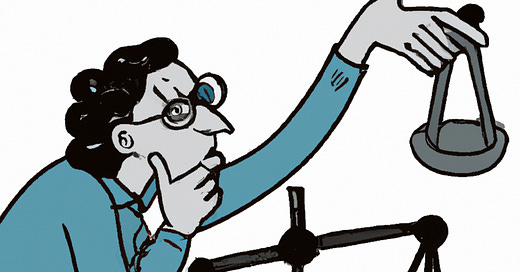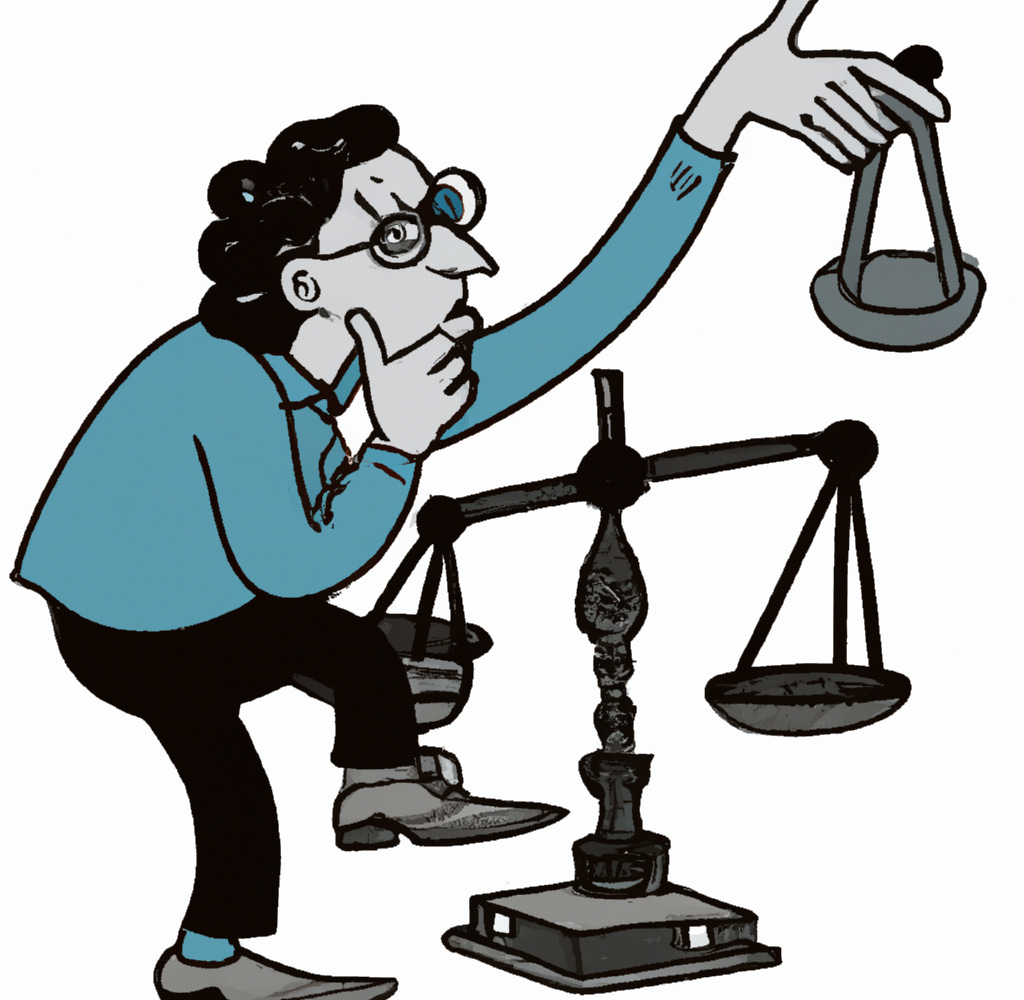“Why Do You Write About This Rather Than That?” Is Almost Always A Lazy And Unserious Derailing Tactic
People have a lot of interests for a lot of reasons, and it isn’t always clear what will turn out to be most “important” in the long run
I unlocked this post on 7/24/2023. If you enjoy it, please consider becoming a paying subscriber so that you can directly support this sort of work:
One of my main critiques of left-of-center intellectual life is that it feels like there’s been a surge of energy spent not on developing and debating specific arguments and counterarguments, but on developing derailing tactics — ways to avoid even having potentially edifying conversations in the first place.
Let’s say you don’t know anything about an argument other than it makes you uncomfortable, is politically unpopular in your circles, or both. A derailing tactic will allow you to “respond” without actually responding. Some derailing tactics involve simply responding not to the claim being made, but to another, much sillier claim. A says “Some dogs bite people,” and B responds “A is saying we should euthanize all dogs in case they bite people!” Yawn. B will always get 100 times the retweets, unfortunately.
Other forms of derailing involve impugning someone’s very interest in the subject they’re talking about. One very common, very annoying version of this is to accuse them of being interested in the wrong thing — basically a form of zoomed-out whataboutism. I’ve obviously encountered this and you’ll see a ton of it everywhere. Maybe the most common version is lobbed at individuals on the left who are concerned about illiberalism on the left, who are accused of ignoring the more pressing threat of right-wing illiberalism or fascism or whatever.
When I see this coming from academics or journalists, which I do a lot, I find it quite frustrating and anti-intellectual. To the extent this claim is undergirded by any actual thought — and I do think the point is to derail rather than to raise genuine questions — the theory seems to be that intellectual or journalistic inquiry should be guided by utilitarian calculations. You shouldn’t spend your time, or at least not much of it, on a particular beat or concern if there are more “important” concerns elsewhere.
I feel like this is so obviously wrong it shouldn’t need pointing out. But just to tick off some of my issues with it:
—As a journalist or an academic, you decide what to focus on based on a complicated swirl of variables. Some of them are completely random. I hated chemistry in high school. Hated it. And I sucked at it. I think I got a D one or two semesters. Chemistry is both very important and very interesting, but for random reasons I am averse to it, and that means it’s probably unlikely I’ll ever write about it in much depth. Every single journalist and academic on the planet has their own “chemistry.”
—Journalists and academics also are concerned with finding a niche. If you are a young journalist trying to break into the field and differentiate yourself, it probably doesn’t make sense to focus on investigations of Donald J. Trump’s wrongdoings, or on commentary about his moral transgressions. These issues receive near-blanket coverage — all the biggest outlets in the country devote significant resources to them. If a journalist decides, for niche-related reasons, to stay away from covering Trump, that doesn’t mean that that journalist personally isn’t worried by Trump, or doesn’t think covering Trump is important. It just means they have decided their niche lies elsewhere.
—Journalists and academics are also allowed to get tired of things! I’m tired of Trump. I don’t want to write about him anymore. And since there is absolutely zero risk that any coverage gap will emerge here, I feel absolutely fine generally not writing about him. Even if there were a risk of a coverage gap, I don’t think it’s any one journalist’s job to decide that they have to fill it. Maybe there are super-specific exceptions if, like, a plane crashes and you are the only journalist on the planet with serious expertise of the structural failure that led to the crash. But they’re rare.
—There are outsized rewards for journalists and academics who can write about subjects that aren’t getting the attention they deserve. If, as a journalist, you help uncover the mind-boggling excesses of the recovered-memory craze, and publish explosive accounts of it, that will be very good for your career. If someone comes up to you and says “Why would you focus on that issue rather than the vastly larger number of legitimate cases of child abuse?” that person is missing the point so badly that they are probably not worth engaging with at length — or they’re being intentionally obtuse.
—Along those same lines, it isn’t always clear which stories will and won’t turn out to be important until journalists actually take the time to look into them. The recovered memory thing is now considered to be a very, very big deal. But we didn’t always know it would be! In other cases, there are moral panics about things that seem like they might be a big deal, but that sputter out. A journalist who got very excited about the potential link between violent video games and real-world violence in the late 1990s would have ended up wasting their time (in my opinion), but there was nothing untoward about them looking into that issue! That’s what journalists do.
—“Only a small number of people are affected by this” is, more broadly, a frequently callous argument. “Only a small number of people were affected by” the false University of Virginia rape accusations. But they are still human beings who deserved to be exculpated! Or what about someone who languishes in jail for 20 years on the basis of a false conviction? They’re just a single person! Out of eight billion! A ridiculous thing for a journalist to spend any time on, right? If journalists followed the utilitarian calculations suggested by the derailers, we’d have no journalism on truly outrageous instances of injustice affecting individuals and small groups of people.
—More of a meta-comment, but there is often a fundamental level of bullshit — or at least hypocrisy — to these arguments, because the people making them often have rather niche interests themselves. If they genuinely thought it’s bad to spend your time on X when Y is a more pressing issue, they would be dedicating huge amounts of their time to the biggest issues that kill or injure the most humans. But there are a lot of people whose lives are dedicated to (say) reviewing video games who hyperventilate online about how fascism is at our doorstep. If they really thought that, and they followed their own guidance about what people should spend time on, they’d quit tomorrow to fight the fascists. They don’t, because all that’s going on here is derailing, not good-faith arguments.
Of course none of the above means that there are no legitimate arguments about individual people’s interests. If a historian is still questioning whether the Holocaust happened, go ahead, impugn his interest in that subject! But those instances are rarer than most people think. The vast majority of claims about someone being interested in the “wrong” thing are fundamentally bankrupt, in my opinion. People are seeking to derail, not to debate or to understand.
Questions? Comments? Accusations that I should have used this space to raise awareness of starving children? I’m at singalminded@gmail.com. I’m taking a Twitter break soon but follow my alternate account at @jsingalfeed — it’ll be used only to tweet out my work. The illustration was produced by DALL-E 2 after I prompted it with “A journalist looks at the scales of justice with a curious look on his face, cartoon style.”



Personally, I find it suspicious Jesse would take the time to write about this when the much more pressing issue of subscribing to Blocked and Reported on Substack goes unvoiced
Thank you for what you are choosing to write about, and for researching it so well!
I am getting sick of people who point out excesses on the left being told that the right is worse--and then trying to shut the whole conversation down. There are really bad excesses on both sides. Really.
I'm on the left. I'm seeing a lot of knee jerk "well, those on the right are bad, so we can't talk about anything else" and getting tired of it. For parents whose kids have medicalized due to gender dysphoria, with many on the (our) left squelching accurate information about the condition and treatment.... well, these kids are being poisoned and lied to...by the left...and the left has to step up and stop it.
It's like your kid saying that it's ok that they did something bad in school because someone else in school did something worse. Almost every parent has heard that!